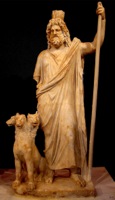Hades
Origin
Greek Aidēs, Āidēs, Haidēs
As with almost every name for the gods, its origin is obscure. The name as it came to be known in classical times was Ἅιδης, Hāidēs. Later the iota became silent.
Originally it was Awides which has been claimed to mean "unseen". This changed into Ἀΐδης, Aïdēs (and afterwards Āïdēs), with the dropping of the digamma. This Ionic and epic form of the name is the one used in epic poetry.
Plato's Cratylus speculates extensively upon the etymology, with the character of Socrates asserting that the god's name is not from aeides (unseen) as was commonly thought at the time, but rather from "his knowledge (eidenai) of all noble things". Others have interpreted it as "the one who presides over meeting up" (in the sense that he is the lord of the place everyone comes to inhabit at the end of his life).
Poetic variants of the name include Ἀϊδωνεύς, Aïdōneus, and *Ἄϊς, Aïs (a nominative by conjecture), from which the derived forms Ἄϊδος, Āïdos, Ἄϊδι, Āïdi, and Ἄϊδα, Āïda, (gen., dat. and acc., respectively) are words commonly seen in poetry.
From fear of pronouncing his name and considering that from the abode below (i.e. the soil) come the riches (e.g. from the soil grow the fertile crops, from the soil come the metals and so on), c. 5th century BCE the Greeks started referring to Hades as Πλούτων, Ploutōn, a name that is an abbreviation of Πλουτοδότης, Ploutodotēs, or Πλουτοδοτήρ, Ploutodotēr, meaning "giver of wealth".
Definitions
- 1: the underground abode of the dead in Greek mythology
- 2: sheol
- 3: often not capitalized : hell
- 4: Pluto
Description
Hades from Ancient Greek Ἅιδης/ᾍδης, Hāidēs; Doric Ἀΐδας Aidas) was the ancient Greek god of the underworld. Eventually, the god's name came to designate the abode of the dead. In Greek mythology, Hades is the oldest male child of Cronus and Rhea considering the order of birth from the mother, or the youngest, considering the regurgitation by the father. The latter view is attested in Poseidon's speech in the Iliad. According to myth, he and his brothers Zeus and Poseidon defeated the Titans and claimed rulership over the cosmos, ruling the underworld, air, and sea, respectively; the solid earth, long the province of Gaia, was available to all three concurrently.
Later the Greeks started referring to the god as Plouton, which the Romans Latinized as Pluto. The Romans would associate Hades/Pluto with their own chthonic gods, Dis Pater and Orcus. The corresponding Etruscan god was Aita. He is often pictured with the three-headed dog Cerberus. In the later mythological tradition, though not in antiquity, he is associated with the Helm of Darkness and the bident. The term hades in Christian theology (and in New Testament Greek) is parallel to Hebrew sheol (שאול, "grave, dirt-pit"), and refers to the abode of the dead. The Christian concept of hell is more akin to and communicated by the Greek concept of Tartarus, a deep, gloomy part of hades used as a dungeon of torment and suffering.[1]
